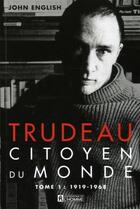-
Nombre de pages : (-)
-
Collection :
(-)
-
Genre :
(-)
-
Thème :
Non attribué
-
Prix littéraire(s) :
(-)
Résumé:
As the Far North assumes an increasingly important role in international politics, so too does Canada’s role in its governance. In 1991, eight countries signed the Arctic Environmental Protection Strategy: Canada, the United States, Russia, Norway, Denmark, Sweden, Iceland, and Finland.... Voir plus
As the Far North assumes an increasingly important role in international politics, so too does Canada’s role in its governance. In 1991, eight countries signed the Arctic Environmental Protection Strategy: Canada, the United States, Russia, Norway, Denmark, Sweden, Iceland, and Finland. This was the first step in the formation of the Arctic Council, which was formally established in 1996 to act as a high-level intergovernmental body to address social, political, and environmental issues in the Arctic. Indigenous peoples, who form a significant population in seven of the eight countries’ Arctic regions, are involved in the council as permanent participants if they represent a single indigenous people across borders. Acclaimed biographer John English explores the history and growing relevancy of the council as Canada becomes the chair of that body in 2013. English chronicles a remarkable shift in Canada’s stance. The Canadian embrace of co-operative multilateralism in the nineties and the jealous protection of sovereignty in 2010 reveal a difference in approach, interest, and values. Both approaches had antecedents in Canada’s past--there has been Liberal unilateralism and nationalist rhetoric too--but there are fundamental differences between Canadian policies in the 1990s and those adopted in the following decade. Ice and Water explores the origins, creation, and development of the Arctic Council as a means of understanding those differences.
Donner votre avis















